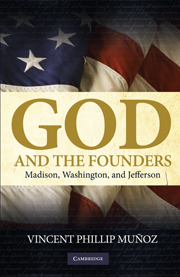Book contents
- Frontmatter
- Contents
- Acknowledgments
- Introduction: The Founders, Religious Freedom, and the First Amendment's Religion Clauses
- PART I THE FOUNDERS' CHURCH-STATE POLITICAL PHILOSOPHIES
- PART II THE FOUNDERS AND FIRST AMENDMENT RELIGION CLAUSES
- 4 Madison's, Washington's, and Jefferson's Church-State Doctrines
- 5 Madison, Washington, Jefferson, and the Establishment Clause
- 6 Madison, Washington, Jefferson, and the Free Exercise Clause
- 7 The Founders v. the Supreme Court
- Conclusion: The Founders and Church-State Jurisprudence
- Appendix A “Memorial and Remonstrance against Religious Assessments” by James Madison, 1785
- Appendix B A Bill “Establishing a Provision for Teachers of the Christian Religion” by Patrick Henry, 1784
- Appendix C A Bill for Establishing Religious Freedom in Virginia by Thomas Jefferson, 1777
- Index
5 - Madison, Washington, Jefferson, and the Establishment Clause
Published online by Cambridge University Press: 05 June 2012
- Frontmatter
- Contents
- Acknowledgments
- Introduction: The Founders, Religious Freedom, and the First Amendment's Religion Clauses
- PART I THE FOUNDERS' CHURCH-STATE POLITICAL PHILOSOPHIES
- PART II THE FOUNDERS AND FIRST AMENDMENT RELIGION CLAUSES
- 4 Madison's, Washington's, and Jefferson's Church-State Doctrines
- 5 Madison, Washington, Jefferson, and the Establishment Clause
- 6 Madison, Washington, Jefferson, and the Free Exercise Clause
- 7 The Founders v. the Supreme Court
- Conclusion: The Founders and Church-State Jurisprudence
- Appendix A “Memorial and Remonstrance against Religious Assessments” by James Madison, 1785
- Appendix B A Bill “Establishing a Provision for Teachers of the Christian Religion” by Patrick Henry, 1784
- Appendix C A Bill for Establishing Religious Freedom in Virginia by Thomas Jefferson, 1777
- Index
Summary
The previous chapter extrapolated legal rules from Madison's, Washington's, and Jefferson's church-state philosophies. This chapter attempts to apply those rules to a sample of historical cases adjudicated under the First Amendment's Establishment Clause. Unfortunately, no commonly accepted typology of Establishment Clause cases exists. In fact, whether a given set of facts qualifies a case for consideration under the Establishment Clause, Free Exercise Clause, or Free Speech Clause can be contentious and highly determinative of a case's outcome. Nonetheless, three general types of cases cover most disputes adjudicated under the Establishment Clause:
Religion in public schools
Governmental support of private religious schools
The presence of religion in the public square, including the participation of religious individuals and organizations in generally available state programs
While not exhaustive, this categorization will let us apply Madison, Washington, and Jefferson to the most fundamental Establishment Clause issues that have come before the Supreme Court. In what follows, I briefly describe examples of each type of case and then explain how each Founder's approach would adjudicate those cases. Tables comparing the Founders' jurisprudential results and a discussion of the most notable differences among the Founders round out the chapter.
RELIGION IN PUBLIC SCHOOLS
Prayer in public school has perhaps been the most enduring source of controversy involving the Establishment Clause. As discussed in Chapter 3, Thomas Jefferson argued against Bible reading in his early nineteenth-century plan for elementary schools.
- Type
- Chapter
- Information
- God and the FoundersMadison, Washington, and Jefferson, pp. 127 - 165Publisher: Cambridge University PressPrint publication year: 2009



